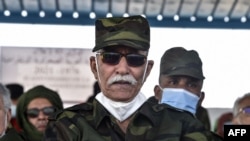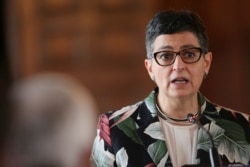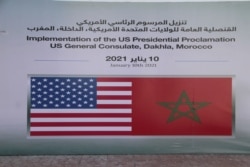A diplomatic dispute between Morocco and Spain over Madrid’s decision to host a leader of the Western Saharan independence movement has soured what had been improving relations across the Mediterranean Sea.
Brahim Ghali, the leader of the Polisario Front, which wants for independence of the Sahrawi people in Western Sahara, is being treated at a hospital in Logroño in northern Spain, after he was infected with COVID-19.
His presence in Spain has angered Morocco which has accused the leftist government in Madrid of endangering relations with Rabat.
The Polisario Front fought a long war against Morocco to win the independence of the disputed Western Saharan territory. Despite a truce in 1991, both sides have been at loggerheads for years.
The United Nations classifies Western Sahara, a Spanish colony until 1975 with a population of one million people, as a “non-self-governing territory.”
The Polisario Front has demanded an independence referendum while Rabat claims the territory as part of Morocco.
Spain has tried to appear neutral on the Western Sahara issue, but analysts suggest that Morocco will use the diplomatic dispute between Rabat and Madrid over the presence of Ghali in Spain to exert pressure on Spain to change its policy.
Rabat complains
Moroccan Foreign Minister Naser Burita asked whether Spain wanted to “sacrifice relations with Morocco” by failing to inform Rabat of Ghali's presence in Spain.
“Why doesn't Spain consider it should have to inform Morocco of the presence of Ghali? Would they rather consort with the enemies of Morocco? This is a test of our relationship,” Burita said in an interview at the weekend with EFE, the Spanish state news agency.
Burita was referring to Algeria when he mentioned Morocco’s enemies as the neighboring North African state champions the cause of the Polisario Front.
The minister said Morocco had supported Spain when former Catalan regional president Carles Puigdemont staged a failed independence declaration in 2017, plunging Spain into its worst political crisis for decades.
Morocco last month summoned Ricardo Díez-Hochleitner, the Spanish ambassador to Rabat, to complain about Ghali’s presence in Spain.
Rabat also accused Madrid of allowing Ghali to enter Spain with a false passport and identity, adding that there are several complaints against Ghali in Spain for allegations of “war crimes and human rights violations.”
Ghali has been accused by a dissident Polisario Front group based in Spain called ASADEDH, who accuse him of torture and crimes against humanity, charges that Spanish authorities are investigating.
The dissidents claim members the Western Saharan independence movement held them in camps in Algeria against their will.
Spanish Foreign Minister Arancha Gonzalez Laya told journalists Spain admitted Ghali for “strictly humanitarian” reasons, saying he was recovering from coronavirus.
Spain's National Court, which deals with serious cases of terrorism and fraud, has summoned the militia leader to appear on June 1 to answer allegations of torture made by Polisario Front dissidents.
“Ghali has been summoned to appear on June 1 if he is well enough to attend the hearing,” a court spokesman told VOA.
Gonzalez said Spain's justice system would deal with any allegations against the Polisario leader but it had nothing to do with the Spanish government.
“If the justice system believes Ghali must answer to the justice system, then he will appear before the court,” she added during a press conference last week.
“It will not be the government that intervenes in the independent and free operation of justice in our country. Justice will do what it has to do and the government will fully respect it as it cannot be otherwise in a democratic country.”
Spanish media reported that Ghali had given a false name and used an Algerian diplomatic passport to enter Spain.
Ignacio Cembrero, a Spanish journalist who has written widely about Morocco, said Rabat will try to use the Ghali row to change Spain's policy on Western Sahara.
Spain under pressure
At present, Spain maintains a solution to the issue can only come from an agreement brokered by the United Nations but, Cembrero contends, Morocco may try to push Spain to change this stance to one more sympathetic to Rabat.
“In public Spain would never admit that it had changed its policy,” Cembrero told VOA.
“However, in private Spain may act more favorably towards Morocco's ambitions to rule Western Sahara. Over the years, Spain has quietly helped Morocco by aiding it at the United Nations and in its legal battles at the European Court of Justice.”
Spain has sought to distance itself over international disputes over Western Sahara, conscious of the possible effect this could have on trade and security relations between the close neighbors, experts said.
Last week, a fresh disagreement erupted between Morocco and Germany over the disputed territory, with Rabat recalling its ambassador in Berlin.
Morocco accused Germany of “distancing itself from the spirit of constructive solution with a destructive attitude on the issue of the Moroccan Sahara,” the Moroccan Foreign Ministry said in a statement.
After the U.S. recognized the Moroccan right to control over Western Sahara in January, Germany called for a closed-door UN Security Council meeting to discuss the issue.
The German government said it was “surprised” by Morocco's move to recall its ambassador.
“We are all the more surprised by this measure as we are working with the Moroccan side in a constructive way to resolve this crisis,” the German Foreign Ministry said.







